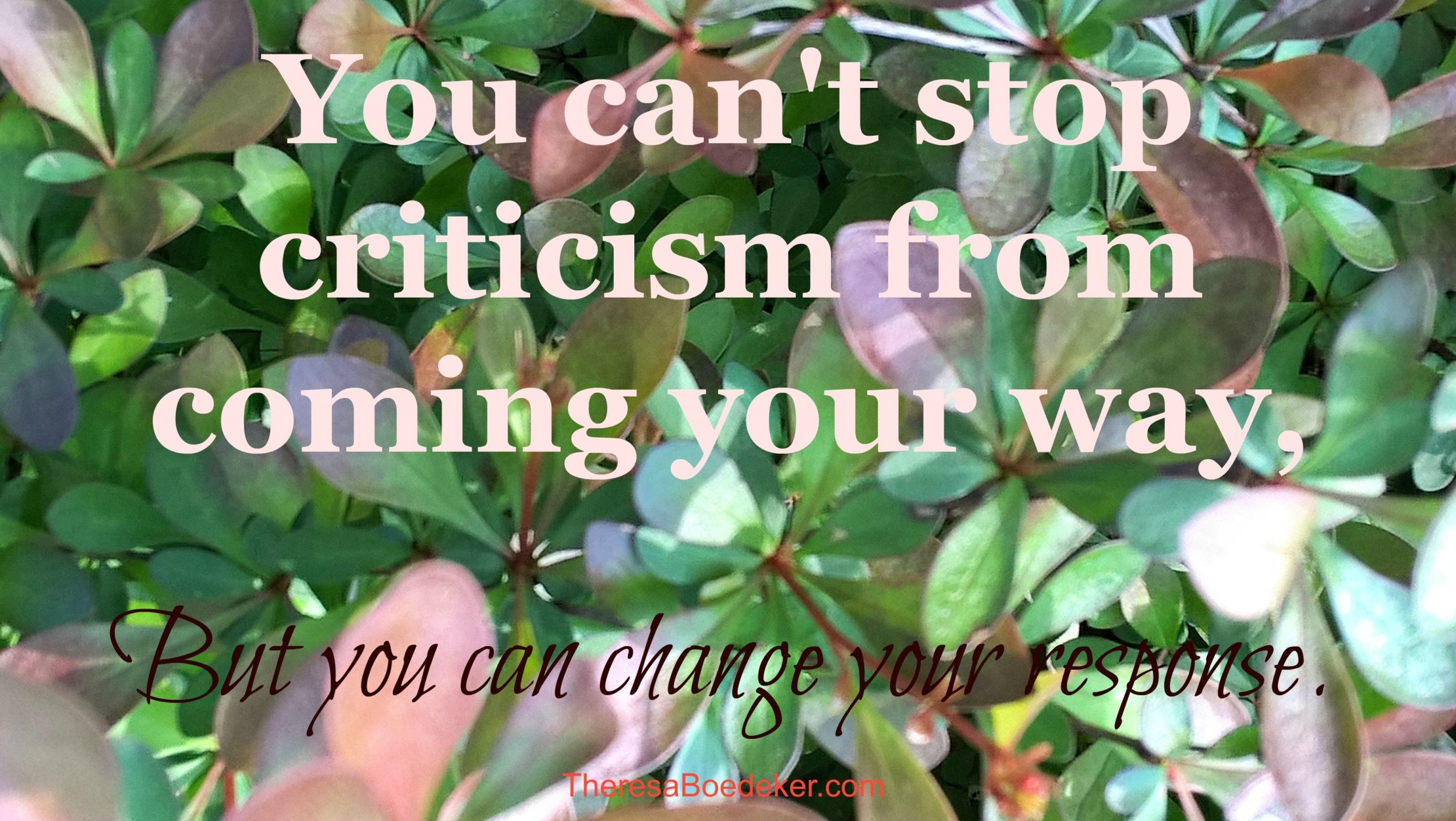

 How should we respond to someone who is pointing out our mistakes in a critical manner?
How should we respond to someone who is pointing out our mistakes in a critical manner?
You know the feeling. You are trying to do your best and someone starts shooting words that send you for a loop. Words that make you want to hide in the back of the coat closet. Words that cause you to start doubting yourself and think something is wrong with you. Words that snatch your smile, send your emotions for a look, and erase your worth away in an instant. Words that bruise you, but leave no outward mark.
These words don’t have to be swearing words. Or I hate you words.
They hurt and bruise because at the heart of the words is criticism. A superiority. A putting you down and pointing out what is wrong about you, but not in a loving or constructive way. These words pin you down like a specimen and provide no grace or room to wiggle free.
They are often casual comments thrown out to bait you. To communicate that you are a failure. Your job was not good enough. You have room for improvement. You made a big honking mistake and by gum they are going to be the one to point it out to you in giant living color.
Sometimes they are deliberate, other times not. They can be masked in humor. They can come from mates, children, colleagues, parents, ex’s, bosses, instructors, neighbors. Often, they come from someone who knows you pretty well. Sometimes it becomes a pattern and it happens over and over.
Your boss criticizing your punctuation mistakes in emails.
You mother in law criticizing your housekeeping.
A colleague asking why you always have to be a party pooper.
An acquaintance criticizing your new dress.
A relative questioning your decisions, big and little.
The neighbor criticizing your schooling choice.
A friend pointing out your proclivity to be late.
The event coordinator reminding that you brought a pie and not a salad, like you signed up for.
Now last time I checked, being a party pooper, bringing pie instead of salad, or being late (along with most of the things they are likely to mention) are not sins, punishable by city ordinances, or even things for which you can get arrested and residing behind bars.
Most of the time you haven’t done anything terribly wrong, but their words make you feel small, in the wrong, and like you have committed some horrible thing because they are pointing out what they consider your flaws, your mistakes, and your habits that they dislike. You hear their critical aha-I-caught-you-words and suddenly bells are clanging in your head and your emotions are shooting out of the starting gate.

 The power of words.
The power of words.
So why do their words send emotions skyrocketing and worth crashing?
Often, their words are hitting upon a sore spot. If our mother criticized our choice of clothes growing up, we will probably react differently to criticism of our clothes then someone whose clothing choices were validated. Words can instantly evoke unpleasant (and pleasant) memories and arouse the emotions that memory carries. Words can have different effects on different people. The same words crush one person, while another person is able to brush them off and laugh at their absurdity.
Our upbringing can affect the way we hear and interpret the words. If we were raised with the expectation of striving for perfection, criticism and a pointing out of our mistakes will often be harder for us than for someone who was raised with the standard of grace and encouragement. If we were criticized for our flaws and mistakes when children, we often spend the rest of our life trying to avoid making mistakes and showing our flaws to others.
Keep track. Are your most sensitive spots, when it comes to criticism and words hurting you, areas you were not allowed to falter or be human in at some point in your life? Were grace and understanding lacking from those same areas?
Knowing which areas critical words have power over you, is helpful in not letting them not blindside and control you.

 How we let critical words harm us.
How we let critical words harm us.
When we base our day, our worth, or our self-esteem on what we do and don’t do, or our performance, then critical words will harm us. We will cower and think the person is pointing a finger at us in condemnation. Or we may rise up in anger and attack them.
Building our worth on what others think and say to us often causes us to wander down the road of self-doubt when we hear critical words. Self-doubt can be a lonely road. We wonder how someone can love us when we are failing. Not perfect enough or good enough. This may lead us to question whether we are lovable. And why would someone love us? Which can lead to how could God love me?
Rising up in anger will isolate us from the person and often convince them of nothing more than their current opinion.
Both responses leave us feeling worse than before.
To stop this cycle, we need to have a plan of action.

 Base your worth on what is true.
Base your worth on what is true.
During his temptation, Jesus fought Satan with scripture. Scripture is truth. It is power.
Remind yourself of God’s truth when you feel yourself sliding down into despair from the words of another. When you feel your temperature rise and you want to toss the person three blocks to the north.
Say these words to yourself until you can own and believe them:
God loves me mistakes, flaws, sins and all. Just the way I am. (You love your child, pet, mate, parent, or friend the way they are. You don’t say, I will love you when you quit doing X and Y. God is the same, only to some mega exponent power.)
He calls me beloved; valuable.
Jesus was perfect so I don’t need to be perfect. He doesn’t expect me to be perfect. He created me as a flawed human, and expects me to make mistakes and mess up.
My worth is not tied into my mistakes, flaws, or sins, or what I do or don’t do.
God will never leave me, forsake me, or quit loving me, no matter what I do.
My joy comes from God, and is not based upon what others think or say about me.
My actions do not define me or my worth.
Tell yourself the truth. Remind yourself of the exact things that critical words often send scurrying from our minds. The truth.
Remember: What matters most is not that you made a mistake, but how you respond after your mistake.

 Some other things to remember.
Some other things to remember.
Critical words and pointing out of flaws happens. We do it. Others do it. It even happens to perfect people. Think about all the times people were critical with Jesus. And he was perfect! So, don’t be surprised when they happen to you.
Sometimes we base our day (and our worth) on how things are going. Good day equals happiness. Day with conflict equals a bad day and we feel down.
Instead of striving to have a good day, or a conflict free day, a perfect day or a strife free day, realize that conflict is part of life. Strive to have a day where you remember your true identity and that it is not tied up into the day’s events or what you accomplish or don’t do. Strive to have a day where you learn, grow, and give others and yourself grace.
We can’t stop criticism coming our way, but we can change our response. We can also quit taking the criticism so personally and owning it, especially when it is untrue. Most criticism has a lot of untruth in it. So toss the untruth into the garbage can and leave it there.
Criticism can be uncomfortable and hard to hear, but it is easier when we remember whose we are and that our worth is not tied to the expectations or words of another.
And when you find yourself doubting your worth, remind yourself of eternal truths, you precious, beloved, and valuable human. Yes, that’s you!

Join the Discussion: How do you handle the criticism of others?
Need more encouragement? Michelle DeRusha, in her post “How to Choose Humility over Humiliation,” talks about how she received some critical words.
Turn Your Children’s Mistakes into Learning Opportunities
Learn 10 steps to help you
Yes! I want the FREE RESOURCE to help guide me in creating
independent children that learn from their mistakes.
Articles is this series:
Yay for Mistakes! Part 1 | What Do You Do?
Yay for Mistakes! Part 2 | How to Respond
Yay for Mistakes! Part 3 | Responding to Our Children’s Mistakes
Yay for Mistakes! Part 4 | How to Let Our Children Make Mistakes and Fail
Yay for Mistakes! Part 5 | Quieting a Myth of Mistakes
Yay for Mistakes! Part 6 | Mistaking Our Worth
Yay for Mistakes! Part 7 | Mistaking Paradise
Yay for Mistakes! Part 8 | Some Mistakes Are Really Blessings in Disguise
Yay for Mistakes! Part 9 | Dealing with Really Big Mistakes
Yay for Mistakes! Part 10 | Letting Go to Make Mistakes
Yay for Mistakes! Part 11 | Dealing With Critical Words From Mistakes
Accompanying this series, Life as it Comes, a story podcast, takes a humorous look at making mistakes in episode 31, “Have You Pulled a Theresa?” and Episode 33, True Green and Garage Chaos .
Thanks for stopping by.
Keep remembering what’s important,
Theresa

Linking up at Jennifer Dukes Lee (#tellhisstory); and Holley Gerth (#coffeeforyourheart), Lori Schumaker (#Moments of Hope). A Wise Woman Builds her Home, Pat and Candy, Messy Marriage, Arabah Joy (#Grace & Truth), Missional Women, Crystal Storms (#HeartEncouragement) and Lili Dunbar (#FaithOnFire).
- How Knowing Your Husband Can Impact Him for Good - March 24, 2022
- How to Stop Focusing on What’s Wrong with You - March 9, 2022
- Is God Really Good All the Time? - February 24, 2022
Theresa, these are such helpful thoughts to remember. I know I’ve been guilty of saying critical things and also being hurt by receiving those kinds of words from others. But you are right. We need to remember the truths of Scripture and that our worth is based on what Christ has done, not on what we do or don’t do. And this I want to remember: “Strive to have a day where you remember your true identity and that it is not tied up into the day’s events or what you accomplish or don’t do. Strive to have a day where you learn, grow, and give others and yourself grace.”
Blessings to you! I’m so glad to be your neighbor at #MomentsofHope
Thanks Gayl. Yes striving to remember my true identity and not basing my day upon words of others or my accomplishments is something I struggle to remember. Blessings to you neighbor.
Theresa, thank you for all the wonderful reminders. I need to remember the big picture and not get stuck in the moment.
Great way to put it, Bliss. The big picture. 🙂
I honestly love constructive words that will help me be the person God wants me to be. I can hear them when spoken in that manner. I close down when spoken another way.
I find this is an area I need to work as far as my words to others. I am pretty straightforward and always looking to improve instead of just letting things be. Mostly with myself.
However in leadership when asked for constructive criticism I can either shy away and say it was all wonderful or give a list of what could be improved on. I need to find the balance of saying what went well along with what we might do the next time differently.
Thank you for your post,
Maree
I so agree with you, Maree. Constructive words are helpful, and when spoken in love they can be easy to hear. Maybe because the love and grace are coming though, or their concern for you is there.
Is can be so easy to be negative, critical, or sarcastic and point out all the problems with someone or something. I find myself working on this too. Sometimes I wish spoken communication was like written communication. With written you can edit and change and rework your words. But spoken words can not be taken back or changed to sound better.
I love your idea of pointing out what went well before moving to what could be done differently next time. How much more willing we would be to hear all the words.
Blessings, Theresa
thank you for the reminder, sweet lady!
Thanks for stopping by.